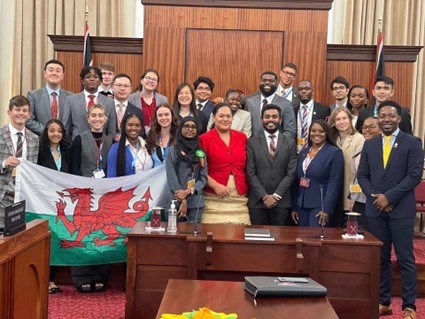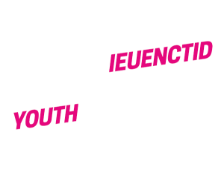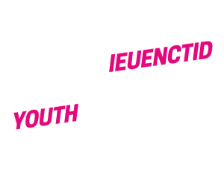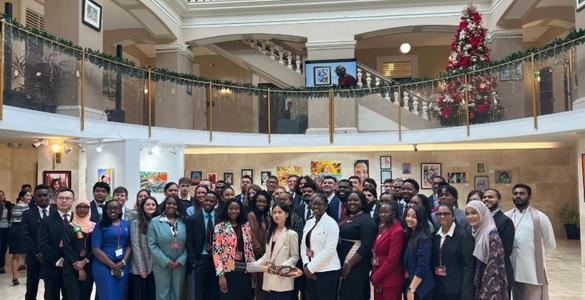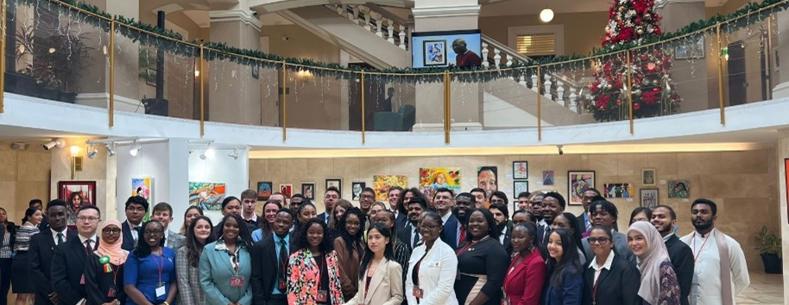November 2022
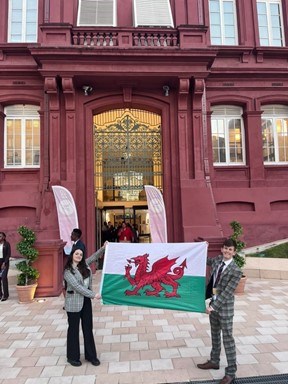
Report by Gwion Rhisiart and Betsan Angell
Introduction
Words by Betsan Angell
The 11th Commonwealth Youth Parliament took place in Trinidad & Tobago in November 2022, with young people representing more than 50 territories comprising the Commonwealth Parliamentary Association. The programme was intended to educate young people on Parliamentary democracies and legislative processes, whilst celebrating cultures from every corner of the world. Gwion and I were given the privilege of representing the Senedd and Wales at the Commonwealth Youth Parliament, tasked with not only representing young people’s views but also where Wales had pioneered in the areas we had been legislating in. We also sought to teach other Commonwealth nations about Cymru’s role in the world, particularly in the age of devolution which has seen historic enfranchisement of young people, such as lowering the voting age to 16 and the world-first Future Generations Act in 2015.
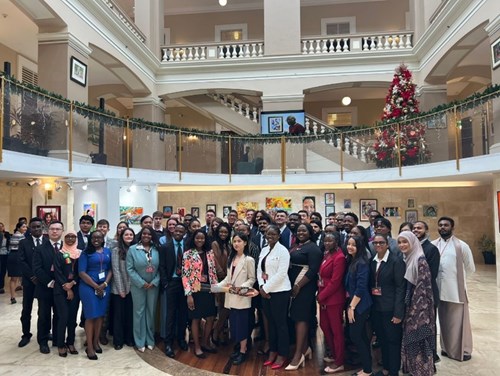
The official CYP photo
Over the three days of Parliamentary business in the beautiful Red House, the Trinbagonian Parliament building, the nations’ representatives split parties to debate a piece of mock legislation. Gwion was a member of the governing New Political Movement, and I was in Opposition as part of the National Labour Party. Debating the Bill allowed us to gain an insight into how Parliamentary processes work, which will help us better represent young people’ issues at the forefront of the government’s agenda. Aside from this, making memories with life-long friends from the four corners of the earth is something Gwion and I will cherish. Learning about these rich cultures has consolidated us as pioneers for young people and we are extremely grateful to Rhun ap Iorwerth MS and the Senedd branch of the CPA, and the Trinbagonian Parliament for giving us the opportunity to represent Cymru on the world stage.
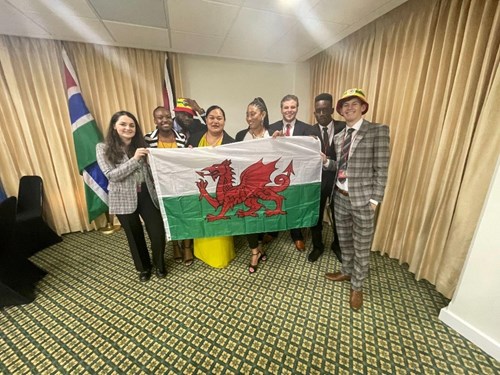
Day 1
Words by Gwion Rhisiart
We started the first day with Introductions, with an opportunity to meet our fellow representatives from the Commonwealth Nations. This was a golden chance to get to know one another, particularly before we divided into party lines. Following this was the Formal Opening of the 11th Commonwealth Youth Parliament, with addresses by Her Excellency the Acting President of the Trinbagonian Parliament and Mr Stephen Twigg, Secretary General of the CPA, who both warmly welcomed us, and gave us sound advice from their decades of public service as we deliberated the mock legislation. To close the ceremony, the Parliamentary choir gave a breath-taking rendition of Caribbean music, truly displaying the best of Trinidad and Tobago’s culture-it made us envious of us not having our own Senedd choir!
In the afternoon, we had a thought-provoking panel discussion on the role of MPs and their experiences, with Trinbagonian MPs sharing their advice for passing legislation. We heard how interacting with the media can prove immensely beneficial to both government and opposition, leading to both frontbenches hosting a press conference with Trinidad and Tobago’s national media. We also heard from the Parliament’s female MPs and the challenges they faced when first standing for office. They gave us inspiring words of advice on dealing with harassment, and overcoming this to be strong role models for young people.
The last event of the day was the beginning of the Parliamentary debate, in the House of Representatives Chamber. My party introduced the Remote Work Bill to the house through our Minister of Public Administration (who we’d elected), who gave a rousing speech in favour of the Bill. This followed a response by the Shadow Minister, who reasonably argued that the Bill needed amending. The Bill made provisions for a Four Day Working Week for workers, in addition to remote work provision, both of which had to be applied for through the employer. Subsequently, the House was adjourned until the following day, where the next Stage would take place.
In the evening, a Welcome Reception was hosted in the stunning Rotunda of the Red House, with MPs, High Commissioners and Ambassadors present. A local band staged a beautiful performance, yet again showcasing the musical talent held in the Caribbean. During the reception, we met with High Commissioners from across the Commonwealth, sharing our experiences with the Welsh Youth Parliament and the positive changes that can be made to enhance youth representation. We also briefly met the British High Commissioner, Her Excellency Harriet Cross, who invited the British delegates to lunch at the High Commission as I’ll discuss later on. It was a thoroughly enjoyable evening, in which we made many connections and learnt more about each other’s democracies.
Day 2
Words by Betsan Angell
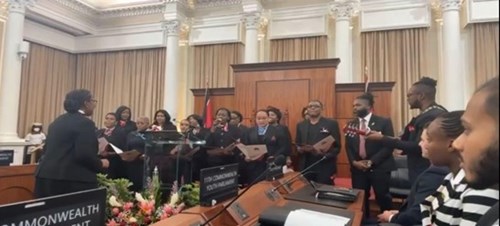
On the second day, we commenced the next Stage of deliberating the Remote Work Bill, where each Member had up to 8 minutes to speak either in favour or against the Bill. The Prime Minister kicked off the debate, stating how in the same way the fictional Kairi and Chaconia’s economy had adapted during COVID-19, it needed to adapt to long term changes too. He argued that in order to create a more sustainable and healthier economy in the long term, enabling remote work and a Four Day Working week was essential. His speech, along with all other Members’ speeches were followed by applause, signifying strong support for the Bill. Gwion was assigned the education brief for his speech, and therefore focussed on the impacts of the Bill on that policy area. He argued that a Four Day Working Week would mean a healthier work-life balance for students and teachers alike, strengthening the stellar education system consolidated under the government’s policies. He also mentioned how a Four Day Working Week could allow time for citizens to learn the national minority languages such as Creole and Spanish, similar to how the Welsh Government offers Welsh lessons to civil servants. He closed by asking Members to vote in favour of the Bill, as it would create a healthier work-life balance and provide opportunities for future generations in the ever-evolving workplace.
On the other hand, I spoke against the Bill, arguing that it was poorly written and that certain discrepancies could allow key workers such as healthcare staff to apply for a Four Day Working Week when this was physically impossible. Whilst I recognised the merits of changing our work environment, I could not accept the Bill as it was presented and therefore urged the government to accept amendments that we would put forward in the next Stage of reading the Bill. A heartfelt and emotional speech in the session that deserves praise is Kilisitina Moala’s, who was representing Tonga on the government side. She made a powerful and heart-breaking speech highlighting the effects of climate change on her native Tonga, with the island only contributing towards 0.3% of global emissions, yet are facing the most dangerous effects of it. Both parties rose to applaud Kilisitina for her brave speech, which argued compellingly that shifting our working patterns could help alleviate climate change. Once every Member had made a speech on the Bill, this brought the second Stage of the Bill to a close, with general consideration of the Bill complete until the final stage on the third day.
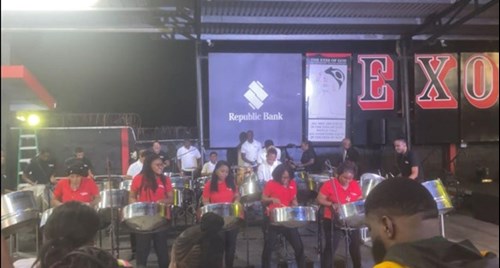
That evening, the Parliament had organised a cultural evening to showcase Trinidad and Tobago’s finest traditions. Once we arrived at the venue, we were greeted with a feast of Trinbagonian food, including the famous doubles-two flatbreads with curried chickpeas and chutney. For many of us, getting to taste Caribbean food was certainly a highlight, with the delicious cuisine making a huge impression on us all! We were then serenaded with a steel drum band and rapper, playing famous songs from the Caribbean and beyond. It’d be a struggle to sum up the evening in one word – ansbaradigaethus is one that certainly does it justice. What an evening!
Day 3
Words by Gwion Rhisiart
By the third day, we’d made such good friends and spent so much time together that it was hard to believe that we had to part the next day-the week was truly an unforgettable experience. Putting aside the memories we had made, we proceeded with the final Stage of reading the Bill-amendments. Both the Government and Opposition had tabled many amendments-similar to real Parliamentary procedures, it was a tedious process which involved a lot of negotiation!
The Government mainly proposed amendments that corrected loose parts of the Bill, with one amendment correcting the legislation so that fines of up to $250,000 could be enforced on lawbreakers, as opposed to $250,000 outright, which could bankrupt smaller businesses. This came about following negotiation with backbenchers, and taught us how we can seek better policies for young people within Parliaments.
On another note, the Opposition proposed an amendment to reform the Industrial Relations Commission that would judge cases where the employer denied remote working or a four day working week. Since the amendment proposed judges would not necessarily have much experience, both sides agreed to an emergency amendment to appoint judges independently. It demonstrated how cooperation with opposition parties can work out for the better, as both sides are working to get the best for their constituents.
Finally, the Speaker put the amended Remote Work Bill to a vote, and it was passed unanimously by the Commonwealth Youth Parliament, signifying an endorsement of new working practices for future generations. Despite the legislation being a mock Bill, this could kick-start a movement from young people for better working conditions in the future-with Four Day Working Weeks being trialled across the world. The entire chamber clapped as the Speaker announced the Bill had been passed, leading onto the Closing Ceremony. The Speaker and Stephen Twigg gave their thanks to the Members for thoughtful contributions, and wished us luck for the future. Both parties returned a thank you to all who made the unforgettable week possible, marking the end of the 11th Commonwealth Youth Parliament.
To close the programme, a farewell dinner was held in Chaguaramas for all who participated. We were yet again demonstrated a feast of Trinbagonian food and music, with Parliament staff thanking us for our attendance and dedication.
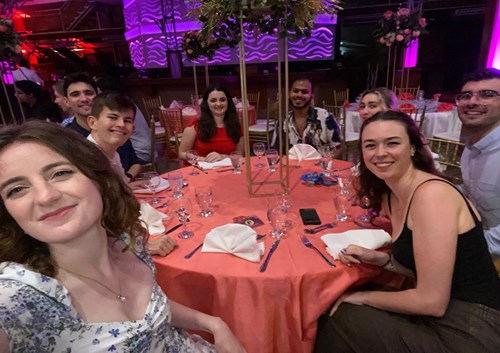
Day 4
Words by Gwion Rhisiart
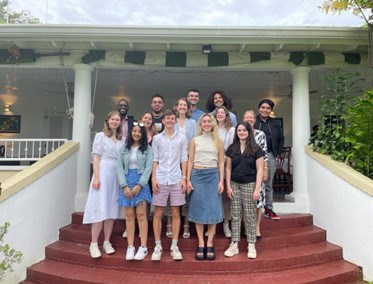
Lastly, Betsan and I (along with the other UK representatives) were invited to the British High Commission in Port of Spain. We were hosted by the High Commissioner, Her Excellency Harriet Cross, and her Deputy, and had the opportunity for a discussion about the incredible experience we’d had in Trinidad over the past week! We also discussed different issues affecting young people, particularly around democracy and voter enfranchisement. Diolch to the High Commissioner for inviting us!
Conclusion
Words by Betsan Angell
Looking back at the unforgettable week we had, it was truly an honour to be able to represent Cymru at the Commonwealth Youth Parliament. Before going, we were unsure about the impact we’d be able to have in such a space. However, participating in a mock Parliament strengthened our position in representing the young people of Wales, through understanding new ways of ensuring legislation enhancing the lives of young people.
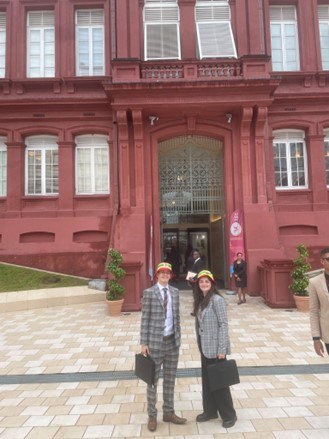
Despite the passed Bill being a mock one, the concept of a Four Day Working week in the real world is far from falsehood. The Welsh Government has said that it is looking into pilots for Four Day Working Weeks, with many companies trialling the project successfully. We also demonstrated where the Wales has been world-leading in initiating a remote working policy for all civil servants, in addition to the Future Generations Act 2015. Even though we debated fiercely along party lines, we came together to forge new, healthier working practices on behalf of young people. Doing so gave us the confidence to represent Wales on the world stage in championing young people’s voices, particularly as 16 and 17 year olds are eligible to vote. Our experience in the Commonwealth Youth Parliament one was not only unforgettable but also enlightening-it taught us that we can empower young people to be both pioneers and Parliamentarians alike. Diolch o galon again to the CPA, Senedd, and Trinidad & Tobago Parliament for inspiring the next generation of Parliamentarians.
